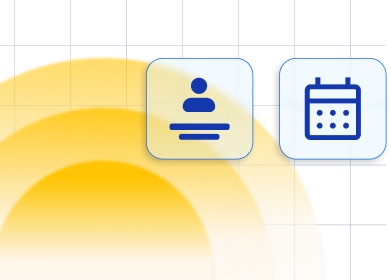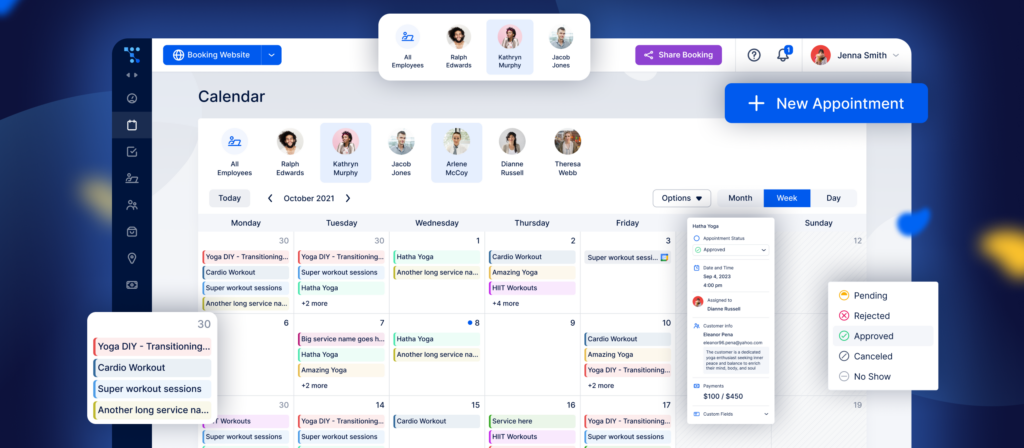Coaches have a great responsibility on their shoulders, as they must inspire their clients. Overcoming fears and going beyond limitations is not easy, and this is where great coaching questions become useful.
So, what can you do to speed up this process and reach new solutions? How do coaching questions help clients grow and deal with challenges?
Coaching questions are a great way to change one’s perspective on things. This is why many professional coaches tested different questions across various niches and subjects.
If you’re interested in this approach, this article brings you examples of the best coaching questions. With these insights, you’ll find valuable resources and learn how to create your own solutions.
Why Are Great Coaching Questions Important?
Although giving answers seems like the right approach, it’s not always the most effective method. Powerful coaching questions can get under the surface and encourage clients to grow.
However, finding the right question for the proper client at the right moment is an art in itself. The role of a life coach is not to teach things, but to listen, discover negative patterns, and help clients find the way to a breakthrough.
Contrary to what many believe, coaches don’t achieve this by walking their clients through every step the best coaching questions are the ones that empower others.
Thus, a coaching session today must:
- Help clients set their own goals.
- Increase self-awareness.
- Improve self-confidence.
- Develop an accountability system to measure results.
- Empower people to find their value and their path forward.
If you ask questions, you’ll be helping your coaching clients with each of these points. Thus, you’ll be raising awareness rather than simply giving instructions. Also, lecturing someone without acknowledging progress is a bad strategy, as it may lead to frustration.
Yet, keep in mind that the most powerful questions can be the simplest ones. It’s not a matter of difficulty, but of impact. Sometimes, a client describes a situation and may believe they have all the answers. However, a simple question can throw them off their track and make them face their current reality. If that’s the case, they’re ready for growth and transformation.
Coaching Question Models Explained
OSKAR
The Oskar model, short for Outcome, Scaling, Know-how, Affirm, and Review, is a solution-focused coaching approach. How does it work?
Process:
- Outcome: Clarify the desired outcome or goal.
- Scaling: Evaluate the current position on a scale to understand progress.
- Know-how: Identify the skills and knowledge needed to reach the goal.
- Affirm: Acknowledge achievements and positive aspects.
- Review: Reflect on what has been learned and plan the next steps.
CLEAR
The CLEAR model focuses on creating awareness and facilitating change through Clarity, Learning, Engagement, Action, and Review. Let’s see how it works:
Process:
- Clarity: Understand the current situation and define the desired outcome.
- Learning: Explore new perspectives and gather insights.
- Engagement: Foster commitment and motivation.
- Action: Develop and implement a plan for change.
- Review: Reflect on the results and adjust strategies as needed.
GROW
GROW, which stands for Goal, Reality, Options, and Will is a widely used coaching questions model that helps individuals set and achieve their goals.
Process:
- Goal: Clearly define the specific, measurable, achievable, relevant, and time-bound (SMART) goal.
- Reality: Assess the current situation and understand the challenges.
- Options: Explore possible strategies and solutions.
- Will: Establish commitment and create an action plan.
Each coaching questions model has its unique strengths and applications. The Oskar model emphasizes a positive, solution-focused approach. CLEAR focuses on creating awareness and facilitating change, while GROW provides a structured framework for goal setting and achievement. The choice between the client.
How to Choose the Best Coaching Questions
The first step is to establish what makes a good coaching question. They should not be statements disguised as questions. For example, “Have you tried setting up a home office so you have more time to set up your strategy?” is not a good option.
Such a statement is more of a suggestion than a question, and the person probably has a premade answer. You should aim to ask clients open-ended questions so that you challenge their thinking process. By this, they can gain a whole new personal perspective.
Here is a list of what the best coaching questions should do:
- Create curiosity
- Stimulate a reflective conversation
- Encourage new ways of thinking
- Unveil underlying assumptions
- Stimulate creativity
- Open the mind to new options
- Generate a boost of energy and desire to move forward
- Channel the client’s attention
- Stay with the participants
- Give deep meaning to a conversation
- Provoke more questions
Notice that questions become stronger when they encourage the person to elaborate and reflect. It also helps if they provide a deeper insight into one’s values and actions. A person may be wondering, for example, “Why do I choose this?”, “Why haven’t I tried this before?”, or “How do I start this?”
Luckily, there are a few standardized questions that professional career coaches find useful.
Asking the Best Coaching Questions the Proper Way
Now that we know what the right types of questions are, we can concentrate on how to ask them. On one hand, some of them work better individually, while others are more effective in a sequence. In that case, you would build one question after the other to reach the desired result.
The most important thing is to provoke exploration and reflection. For additional benefits, remember to center them around the client’s capabilities and goals.
Next, you’ll find a few tips to create the best coaching questions:
- Ask open-ended questions that help the clients think and drive the conversation forward.
- Maintain an impartial approach. Avoid leading questions and don’t try to take the person to any particular solution.
- Go with the flow. Don’t try to look for the perfect question. Instead, follow the natural course of the process.
- Use the client’s own words. Thus, you’ll avoid changing what they’re saying.
- Don’t avoid all These can be useful, especially if the client is going off-topic.
- When you try to move the conversation forward, use “what” rather than “why.” The second option may prompt defensiveness and interrupt exploration.
Finally, don’t look for ready-made formulas. Each person is different, and they will react accordingly. When it comes to life coaching questions, there’s no right or wrong. Think of it as a journey rather than a destination.
Great Coaching Questions to Ask Your Clients
A good coach understands the current situation of the client as well as their goals. The coach’s job is to find where the individual feels insecure and help them overcome obstacles.
Pre-coaching questions
These questions will help you understand the client and know in advance what kind of help you can provide.
- Why are you looking for coaching at this point in your life?
- Have you ever worked with a life coach before?
- What do you expect from each coaching session?
- How will you know that you obtained the desired result?
- Is there a reason you chose this particular coaching business?
- Can you describe what you feel are your biggest achievements at this point in your life?
- What was the worst thing that you’ve had to overcome, and how did you do it?
- What learning process works best for you?
- Can you name those things that stress you the most?
Best coaching questions to understand the person’s mindset
Once you’ve decided to take this new person under your care, it’s time to get to know them. It’s important to understand what makes them happy and what is their highest aspiration in life.
By knowing this, you can help them create more of those happy feelings and possibly establish new goals for the future.
These are some question examples that you can use:
- What types of challenges are you facing right now?
- What matters to you the most at this point in your life?
- What’s on your mind today?
- What opportunities do you see in the near future?
- What topics would you like to cover during this conversation?
- What do you hope to gain from our interaction?
- What would you like to be the outcome of today’s conversation?
- How do you think our session today can help you overcome your present challenge?
- What is the most important thing in your life?
- How happy are you with your life on a scale of one to ten?
- How would you like to feel once our coaching program ends?
Coaching questions to establish direction
This series of questions will help you to realize what the client hopes to achieve from their sessions. You’ll also know whether they need a one-time session or a longer sequence. Now, shift the focus from the problems to the possibilities:
- What would you like to have accomplished once our sessions are over?
- What would be the best possible outcome?
- What do you want to achieve?
- How would you know that the sessions have been successful?
- What would be the next step for you?
- What does success look like to you?
- How will you know if you are successful?
- What is the most significant type of success that you would get from our sessions together?
Your Success Depends on Efficient Scheduling – Trafft is Here to Help
If you’re a coach seeking the perfect scheduling solution, look no further than Trafft – the ultimate coaching software for appointment scheduling, tailor-made just for you.
Trafft surpasses the ordinary, offering a plethora of robust features crafted to streamline scheduling, elevate your coaching practice, and enrich the client experience.
What can Trafft offer to coaches?
Efficient Scheduling: Trafft’s platform is meticulously designed to minimize scheduling errors, ensuring that your coaching sessions run seamlessly without any no-shows or double bookings. You can trust Trafft to keep your schedule organized and efficient.
Advanced Coaching Features: With Trafft, enjoy a suite of advanced features catering specifically to coaching businesses. Benefit from support for multiple locations, multi-language capabilities, recurring appointments, and group bookings. Easily reschedule sessions, set up reminders, and tailor booking forms to align with your coaching services.
Integration Power: Trafft seamlessly integrates with popular tools such as MailChimp, Google Analytics, Stripe, PayPal, and Zapier. Moreover, it offers native integrations with Zoom and Google Meet for scheduling virtual coaching sessions. This level of integration simplifies your workflow and enhances your coaching services.
Business Insights: Trafft provides insightful business dashboards to help you gather essential metrics. These metrics are invaluable for making data-driven decisions and refining your coaching practice.
Enhanced Customer Experience: Personalize your clients’ coaching experience by taking notes on their preferences and needs. This feature enables you to forge stronger connections with your clients and gain deeper insights into their requirements.
Secure Payments: With Trafft’s integrated payment processing, you can rest assured that you’ll always receive timely payments, whether after the coaching session or in advance. This feature is vital for managing your finances and mitigating the risk of no-shows.
Affordable Pricing: Understanding the needs and budgets of coaching businesses, Trafft offers a free plan for up to 5 members, making it accessible for small coaching practices. Paid plans start from just $29 per month, allowing you to scale as your coaching business expands.
Top Ratings: Trusted by coaches like you, Trafft boasts top ratings, earning a 5/5 on Capterra, 4.7 on G2, and excellent ratings on TrustPilot and GetApp.
Don’t wait any longer; sign up for Trafft for free today and discover why it’s the premium scheduling solution for coaches. Supercharge your coaching practice and provide your clients with a seamless booking experience.
Want to know more? Check out Trafft’s awesome features to see what you are missing.
Best coaching questions to tap into the values
Next, you’ll find some powerful coaching questions to help the clients explore their options, values, obstacles, and strengths.
- What is so important to you about this goal?
- When it comes to money, what are you proud of?
- What is the main thing that you want to achieve in your career?
- You respect partners and friends who do what sorts of things?
- Why is health important to you?
- Why are learning and growth important to you?
- Why do you make time for recreation?
- What does spirituality mean to you?
- How does it make you feel to be part of your community?
- Can you identify any common topic among your answers?
- What meaning do you think you can draw from your answers?
Coaching questions encouraging self-inquiry
The best coaching questions are the ones that invite people to dig deeper into themselves. Self-inquiry is a vital part of the process. With the following questions, you’ll create motivation and commitment and help clients develop their own plans for taking action.
To summarize, ask them what will happen next:
- What information do you need in order to make a decision?
- What can you do now?
- What are you gaining from this conversation that will help you take the next step?
- What kind of support do you need and where will you get it?
- How can I help you?
- What is the best way to motivate yourself?
- At this point, what is the best way you can support yourself?
- If you had no limitations, who would you like to be?
The best life coaching questions
- What does success look like for you in various areas of your life?
Encourages the individual to clarify their definition of success and identify key priorities.
- If there were no limitations or obstacles, what goals would you set for yourself?
Encourages thinking beyond perceived limitations and helps to uncover hidden aspirations.
- What values are most important to you, and are they reflected in your daily life?
Promotes self-awareness by exploring personal values and assessing alignment with daily actions.
- What do you believe is holding you back from reaching your full potential?
Helps identify limiting beliefs or obstacles that may be hindering personal and professional growth.
- If you achieved your ideal future, how would your life be different?
Encourages visualization of a positive future and sets the stage for goal-setting.
- What small steps can you take today to move closer to your long-term goals?
Emphasizes the importance of taking actionable steps and breaking down larger goals into manageable tasks.
- How do you handle challenges, and what strategies can you implement to overcome them?
Explores resilience and problem-solving skills, encouraging proactive approaches to challenges.
- In what areas of your life do you feel the most fulfilled, and what contributes to that feeling?
Promotes self-reflection on sources of fulfillment, aiding in the pursuit of a balanced and satisfying life.
- What habits or behaviors might be holding you back, and how can you replace them with positive ones?
Addresses self-sabotaging behaviors and encourages the development of healthier habits.
- If you were to describe your ideal life in vivid detail, what would it look, feel, and sound like?
Encourages the individual to create a detailed vision of their desired future, providing clarity and motivation.
The best business coaching questions
Business coaching is about guiding individuals to enhance their professional performance and achieve their business-related goals. We’ve prepared ten insightful business coaching questions you can ask your clients:
- What specific business goals do you aim to achieve in the next 6-12 months?
- How do you currently prioritize and manage your time to align with your business priorities?
- In what ways do you believe your leadership style influences the dynamics within your team?
- What challenges or obstacles are you currently facing in your business, and how can we address them?
- How do you ensure that your team is aligned with the company’s mission and values?
- What feedback have you received from your team, and how do you plan to incorporate it into your leadership approach?
- In what ways can you leverage your strengths to maximize your impact on the business?
- What steps can you take to enhance communication and collaboration within your team?
- How do you adapt to changes in the business environment, and what strategies do you employ for innovation?
- What professional development opportunities are you exploring to enhance your skills and stay competitive in your industry?
The GROW Model as a Conversational Structure

Many professionals use the GROW Model including managers and leaders. The reason is simple: it helps employees improve their performance, solve issues, learn new skills, and achieve further goals.
This model works best in brief sessions where you need to cut to the point quite fast. Here you can learn more about the four main steps of the model
Goal
You and your client must determine short- and long-term goals. These should be as specific as possible and come from internal motivations. Establishing goals is a very important stage of the process, because the better established the goal is, the more smoothly the rest will go.
Possible goal coaching questions:
- How are you?
- What improved or became worse since our last session?
- What would you like to talk about now?
- What is today’s primary goal?
- Why did you choose that particular goal?
- What benefits will it bring you?
- How will you know that you’ve achieved it?
- How will your life change in the process of reaching this goal?
- What would make the goal more measurable so that you can be certain you’ve achieved it?
- What is the deeper meaning that you find in this goal?
- When do you want to achieve it?
- How will you know that you have obtained the results that you expect?
Reality
At this stage, the professional coach must help the client figure out what their current situation is. You’ll both engage in a fact-finding mission focused on assessing the circumstances. Thus, you have to find out the severity of the problems or challenges that they are facing.
All in all, it’s about providing context and bringing to light any issue that the client may not be already aware of.
Here are some examples:
- What is your current position on this goal?
- What have you accomplished so far?
- What have you tried in the past? Did it or did it not work?
- What decisions or events led you to this point?
- Who else is part of this situation and what is their role?
- On a scale of one to ten, where do you feel you are in reaching your goal?
- During this time, what has held you back or made you progress?
- What do you think you need in order to achieve the goal?
- If you ask for that thing, what do you think would happen?
- What could you do differently this time?
- Do you know anybody who has achieved a similar goal? How did they do it?
Options
Now it’s time to develop a plan. Encourage the client to find solutions and take action toward their goal. This is the perfect time to find creative ways to overcome obstacles.
Some questions are:
- What would be the first step towards your goal?
- What would be the next step?
- Is there any other way to do it?
- Who can help you in this process?
- What did you learn from past experiences that may help you now?
- What do you think would happen if you try that again?
- What are the pros and cons of choosing this approach?
- Which possible way do you feel prepared to undertake?
- Do you have enough resources and time?
- If this is not an issue, how will you achieve your goal?
- What obstacles could this option entail?
- What resources do you need to get the desired results?
- Do you need support to achieve your goal? From whom?
Will
Once the goal, the situation, and the course of action have been established, it’s time to work. Help the client identify the exact steps, the persons that will be involved, and the support that they need.
At this stage, the key questions revolve around “what’s next”:
- Which option do you want to choose to take action?
- How can we turn it into a task?
- What is your priority at this stage?
- By what time would you like to complete this?
- How likely is it possible for you to get this done within this timeframe? Choose a number from one to ten.
- How can we make that an eight?
- Are there any obstacles that you foresee?
- What will happen once you achieve the goal?
- What will be your first step?
- How long do you think it will take you to achieve your goal?
- How will you maintain your commitment?
- Who will hold you accountable for this?
- Who will you report to and how will you track your progress?
- What would make the experience more pleasant for you?
- When should we touch base again?
FAQs About the Best Coaching Questions
1. What are the key characteristics of powerful coaching questions?
Open-ended, challenging, and centered on the client’s values and goals, powerful coaching questions should be employed. The client should be encouraged to reflect on their thoughts and feelings and to think carefully. Insightful coaching questions also help the client become more self-aware, discover their strengths and flaws, and obtain new perspectives.
2. How can I use coaching questions to help my clients develop self-awareness?
In order to help your clients analyze their feelings, beliefs, and behaviors, you can use coaching questions. They can grow in self-awareness by answering inquiries that invite clients to consider their experiences and spot patterns in their thinking or behavior.
Also, clients might get fresh viewpoints and insights into their inner selves by asking questions that challenge their presumptions or preconceptions.
3. What are some examples of coaching questions that help clients identify and achieve their goals?
Focusing on the client’s vision, motivation, and action plan will help you ask coaching questions that will assist your clients in identifying and realizing their goals.
Such inquiries can include “What is your target outcome?” as an example. What inspires you to accomplish this objective? How are you going about achieving your objective? These kinds of inquiries aid customers in maintaining their attention, drive, and sense of responsibility.
4. How can I adapt my coaching questions to different personality types?
It’s critical to modify your strategy and coaching questions while working with customers of various personality types. For instance, some clients could respond better to questions that are specific and applicable, whilst others might like queries that are more general and theoretical.
You may better cater your coaching questions to the needs of your clients if you are aware of their personality type and preferred method of communication.
5. What are the best coaching questions for helping clients overcome self-doubt and limiting beliefs?
Clients should be encouraged to question their presumptions and consider other viewpoints in response to coaching questions that support clients in overcoming self-doubt and limiting beliefs.
They include inquiries like “What proof do you have that your belief is accurate?” What would occur if you held the opposing belief? What assets and skills do you have that can assist you in getting through this challenge?
6. How can I use coaching questions to help clients navigate difficult or challenging situations?
By encouraging clients to concentrate on solutions rather than issues, coaching questions can aid them in navigating demanding or unpleasant circumstances. In order to stay grounded and motivated during trying times, clients may benefit from being asked questions that enable them to recognize their strengths, values, and priorities.
Also, clients may be assisted in overcoming difficulties and achieving their objectives by inquiries that assist in identifying potential barriers and creating a plan of action.
7. What are some coaching questions that can help clients improve their communication and relationships?
Active listening, empathy, and effective communication should all be emphasized in coaching questions that assist clients better their relationships and communication.
Such inquiries can include “How do you suppose the other person is feeling?” as an example. What can you do to demonstrate that you recognize their plight and share their empathy? How do you express yourself to another individual in a way that they can understand?
8. How can I use coaching questions to help clients develop resilience and cope with stress?
By focusing on their strengths, values, and aspirations, clients can be helped by coaching questions to become resilient and manage stress.
Building resilience and maintaining motivation through trying times can be facilitated by asking clients questions that help them recognize their causes of stress, create coping mechanisms, and reframe unfavorable beliefs.
9. What are the best coaching questions to help clients identify and prioritize their values?
Clients should be encouraged to consider what is most important to them through coaching questions that assist them in identifying and prioritizing their values.
Such a question might be, What is the most significant thing in your life? What do you hope to be known for? What behaviors reflect your values? These kinds of inquiries can assist clients in identifying their values and using them as a framework for decision-making.
10. How can I use coaching questions to help clients develop a growth mindset and embrace change?
By focusing on learning, progress, and self-improvement, coaching questions can help clients embrace change and build a growth mindset.
The following are some examples of these queries: What have you learned from this experience? What new abilities or information have you acquired? What actions can you take to become better going forward?
These kinds of inquiries can assist clients in adopting a growth mindset and viewing change as an opportunity for development rather than a danger or difficulty.
Final Thoughts on the Best Coaching Questions for a Successful Session
A big part of being a successful coach is the ability to ask the right questions. The bottom line is that coaching questions must be open-ended and encourage the client’s thinking process.
Life and career coaches should not give a set of instructions to follow but rather help people make their own decisions and draw their own conclusions.
But even the best coaching questions must be complemented with the right coaching skills. Active listening, genuine curiosity, and positive behavior are only a few examples of what it takes to be a great coach.
Hungry for more?
We have just what you need! Dive into additional resources about coaching and gain more knowledge:










